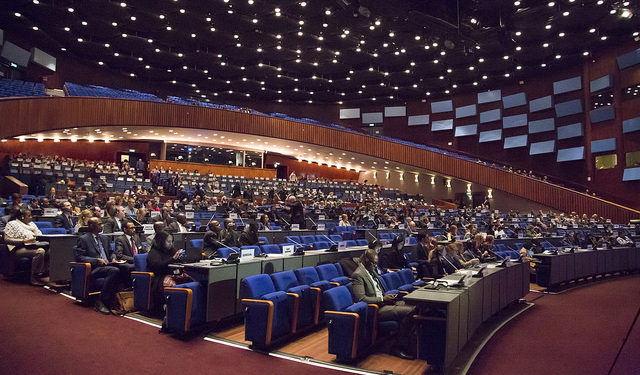By Kwamchetsi Makokha
Africans pulling out of the International Criminal Court have edged themselves to the top of the agenda at the 15th Assembly of States Parties, which began at The Hague Wednesday.
South Africa, Burundi and Gambia last month shocked the international community by lodging notices of their intention to withdraw from the treaty that creates the ICC, sparking fears that the threat of a mass pullout by African Union member states could become a reality.
Although not listed in the official Journal of the Assembly of States Parties, the withdrawals were on the lips of every envoy that spoke at the opening general debate Wednesday.
The keynote speaker, UN High Commissioner for Human Rights Prince Zeid Sa’ad al Hussein, was tough on those intending to pull out: “If the State Parties, who apparently have been masquerading in recent years as countries devoted to criminal accountability want to leave, then they should leave.” But a cross-section of envoys appeared conciliatory, offering dialogue and sometimes pleading for those who had left to come back.
The African Union has twice mandated the ‘open-ended’ ministerial committee to strategise on a mass pullout from the ICC. It attempted to negotiate with the United Nations Security Council suspension of criminal charges against serving heads of state but both meetings have been called off at the last minute.
Representatives of the European Union expressed fears that the withdrawals could encourage aggrieved parties to take the law into their own hands.
Swiss ambassador to the Netherlands Jurg Lindenmann, while saying his delegation was open to dialogue, drew a line in the sand: “We would rather have an effective ICC supported by many, than a weak institution accepted by all.”
“We will not find peace where criminals find refuge,” added Australia’s ambassador to the Netherlands.
Although two warrants of arrest against Sudanese President Omar el-Bashir on genocide, war crimes and crimes against humanity issued by the ICC have been in force for six years, they have acquired new political symbolism for those resisting the court after Uhuru Kenyatta and William Ruto ascended to the presidency in Kenya soon after their own crimes against humanity charges were confirmed.
Kenya has been an influential voice in mobilizing the African Union against the court, squeezing out major concessions on rules of procedure and evidence at the ASP, such as the excusal of accused persons from physical presence at trial and the exclusion of prior recorded testimony for witnesses who are not able to be present in court. This year, there was no sign of the traditionally large Kenyan delegation of ministers, Members of Parliament and civil servants that accompany diplomats to the ASP. Ms Makena Muchiri confirmed that she will be leading the Kenyan delegation and speaking formally Thursday.
The cases against Kenyatta and Ruto have been withdrawn and vacated, respectively. In the Kenyatta case, the judges referred Kenya to ASP for failing to hand over evidence while the Ruto case was terminated for what the judges termed as “intolerable levels of witness interference and political meddling”.
South Africa was still defending its failure to arrest el-Bashir during an AU heads of states summit in Johannesburg; while the ICC prosecutor has initiated a preliminary investigation into possible war crimes and crimes against humanity in Burundi. Gambia issued its withdrawal notice citing the failure by the ICC to prosecute former British Prime Minister Tony Blair, but is itself headed into an election next year with three opposition leaders in detention.
The withdrawals by African states could not have come at a more incongruous time when Senegalese Justice minister Sidiki Kaba is President of the Assembly of States Parties. Some envoys quietly feel that Kaba’s soft, behind-the-scenes approach has emboldened African states to bully the ICC.






